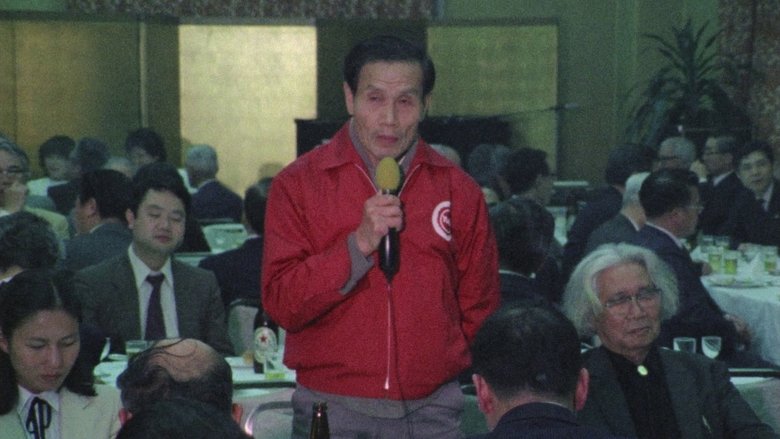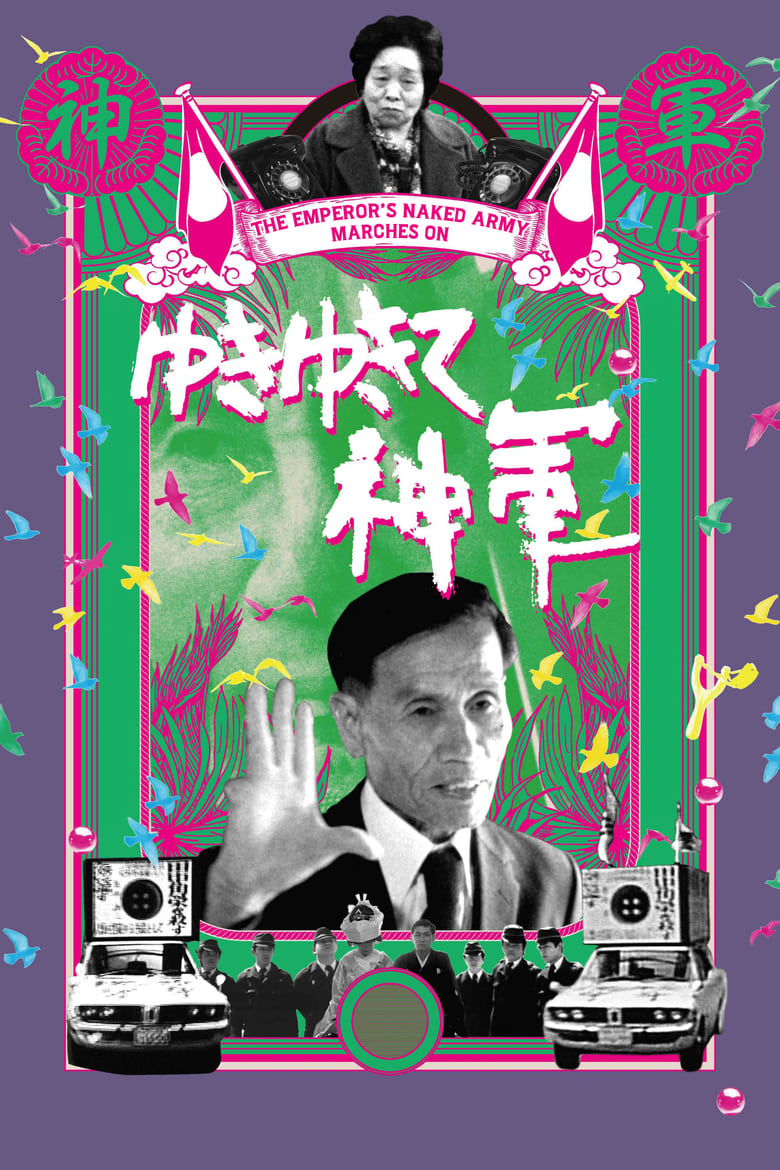

The Emperor's Naked Army Marches On
Genres
Overview
Kenzo Okuzaki, a 62-year-old veteran of the New Guinea campaign in World War II, sets out to conduct interviews with survivors and relatives to find the truth behind atrocities committed while the Japanese garrison was surrounded, in particular the unexplained killing of two Japanese privates in his unit.
Details
Budget
$222000
Revenue
$0
Runtime
122 min
Release Date
1987-08-01
Status
Released
Original Language
Japanese
Vote Count
46
Vote Average
7.5
Kenzo Okuzaki
Self
Masao Koshimizu
Self
Riichi Aikawa
Self
Masaichi Hamaguchi
Self
Toshio Hara
Self
Shichiro Kojima
Self
Taro Maruyama
Self
Toshiya Nomura
Self
Shizumi Okuzaki
Self
Eizaburo Oshima
Self
Rinko Sakimoto
Self
Yukio Seo
Self
Iseko Shimamoto
Self
Minoru Takami
Self
Kichitaro Yamada
Self
8.5
The Plan
Let's look back at the 18th presidential vote. The 13,500 ballot boxes were taken to 251 ballot count locations and were sorted by 1,300 automatic ballot openers. The chairman announced the sorted data and soon it was announced to the public. But something strange happened. The 251 ballot count locations found 'a number' that have the same pattern. Scientists, mathematicians, statistician and hackers from all over the country start looking into the secret of 'this number'. The result is tremendously shocking...
2017-04-20 | ko
8.0
June 1940, the Great Chaos
From May 10, 1940, France is living one of the worst tragedies of it history. In a few weeks, the country folds, and then collapsed in facing the attack of the Nazi Germany. On June 1940, each day is a tragedy. For the first time, thanks to historic revelations, and to numerous never seen before images and documents and reenacted situations of the time, this film recounts the incredible stories of those men and women trapped in the torment of this great chaos.
2010-06-14 | fr
0.0
La bataille de Florange
2016-10-26 | fr
0.0
The Road to Mass Incarceration
This video, The Road to Mass Incarceration, by Greenhouse Media summarizes criminal justice policy decisions dating back to the 1960s. Although the effects often took decades to manifest, each of these policy shifts increased the rate of incarceration in the U.S. The video ends with many of the architects of these changes, Democrats and Republicans alike, admitting the failure of these policies and suggesting that it is time for real change.
2018-06-13 | en
6.9
The War Room
A behind-the-scenes documentary about the Clinton for President campaign, focusing on the adventures of spin doctors James Carville and George Stephanopoulos.
1993-11-03 | en
8.5
The Making of a Japanese
Intimately following 1st and 6th graders at a public elementary school in Tokyo, we observe kids learning the traits necessary to become part of Japanese society.
2024-04-05 | ja
5.5
War Game
A bipartisan group of U.S. defense, intelligence, and elected policymakers spanning five presidential administrations participate in an unscripted role-play exercise in which they confront a political coup backed by rogue members of the U.S. military, in the wake of a contested presidential election.
2024-08-02 | en
0.0
Putin's Obsession: The Fight For Ukraine
A profile of Putin, exploring his complicated relationship with Ukraine. Why does this neighbouring nation threaten his power and identity?
2022-05-25 | en
0.0
A Little Fellow from Gambo: The Joey Smallwood Story
This feature-length documentary paints a lively portrait of Father of Confederation and first premier of Newfoundland Joseph Roberts Smallwood, or "Joey," as he is known to most Canadians. Following one of Canada’s most colourful political figures during a two-and-a-half-month period that included a stormy Liberal leadership convention, the film reveals a man misunderstood even by his close associates.
1970-01-01 | en
8.0
RFK
David Grubin's probing and perceptive biography reassesses the remarkable and tragic life of Bobby Kennedy, whose early life was spent in the shadow of his elder brother John. After JFK's assassination, he discovered his own identity in the forefront of American politics before his career was also tragically curtailed by an assassin's bullet.
2004-05-01 | en
8.6
Hoxsey: When Healing Becomes a Crime
In the 1920s, former coal miner Harry Hoxsey claimed to have an herbal cure for cancer. Although scoffed at and ultimately banned by the medical establishment, by the 1950s, Hoxsey's formula had been used to treat thousands of patients, who testified to its efficacy. Was Hoxsey's recipe the work of a snake-oil charlatan or a legitimate treatment? Ken Ausubel directs this keen look into the forces that shape the policies of organized medicine.
2005-05-17 | en
0.0
Unsichtbare Hausarbeiterinnen
Documentary about women without papers, living in Germany and working as maids.
1999-01-01 | de
8.0
Radio Silence
Mexico, March 2015. Carmen Aristegui, incorruptible journalist, has been fired from the radio station where she has worked for years. Supported by more than 18 million listeners, Carmen continues her fight. Her goal: raising awareness and fighting against misinformation. The film tells the story of this quest: difficult and dangerous, but essential to the health of democracy. A story in which resistance becomes a form of survival.
2021-04-15 | es
0.0
Ten Eleven O Two
Over the weekend of October 11, 2002, my uncle along with two friends set out on a camping trip in the Sierra Nevada mountains. Upon returning home, they were changed men, and recounted tales of alien abduction. Today, only two of the three men are alive to tell the story of what unfolded before, during, and after that fateful outing, and they're convinced it was extraterrestrial. This film explores the haunting accounts of two friends who underwent an alien abduction experience while camping in the remote mountains. Featuring psychedelic visuals and an alien hand print, Ten Eleven O Two opens a plethora of questions and is a must-see for anyone interested in the paranormal. Based on the true life events of Ken Mathis and Adolph Santistevan.
2016-07-15 | en
9.3
Freedom on Fire: Ukraine's Fight For Freedom
Personal stories from civilians, children, soldiers, doctors, the country’s elderly, journalists, religious leaders, and international volunteers - a handful of the millions of people whose lives have been turned upside-down by nine years (and counting) of Russian aggression against Ukraine.
2022-08-31 | uk
2.5
Diary of a Political Tourist
Following the 2002 HBO documentary "Journeys with George," Pelosi's irreverent account of George W. Bush on the campaign trail, she set out on the road again with a handful of distinguished men competing to see who could eat the most pies, raise the most money and get the most votes to become the Democratic Party nominee.
2004-10-11 | en
7.6
The Choice 2024: Harris vs. Trump
The documentary investigates the lives and characters of Kamala Harris and Donald Trump as they seek the presidency. In a historic election, those who know the candidates best reveal key moments that shape how they would lead America. Award-winning filmmaker Michael Kirk and his team sat down with Trump and Harris’ friends, advisors and critics, as well as authors, journalists and political insiders to present deeply reported narrative arcs of both candidates’ lives, going all the way back to their childhoods. What emerges in FRONTLINE's "The Choice 2024: Harris vs. Trump" is the story of two fighters: One seeking vindication and promising a return to greatness, and the other seeking to move beyond the past and promising a greater future.
2024-09-24 | en
0.0
Paul Robeson: Here I Stand
Paul Robeson: Here I Stand presents the life and achievements of an extraordinary man. Athlete, singer, and scholar, Robeson was also a charismatic champion of the rights of the poor working man, the disfranchised and people of color. He led a life in the vanguard of many movements, achieved international acclaim for his music and suffered tremendous personal sacrifice. His story is one of the great dramas of the 20th century, spanning an international canvas of social upheaval and ideological controversy.
1999-02-24 | en
8.0
The Nuremberg Trials
One journalist described it as a chance "to see justice catch up with evil." On November 20, 1945, the twenty-two surviving representatives of the Nazi elite stood before an international military tribunal at the Palace of Justice in Nuremberg, Germany; they were charged with the systematic murder of millions of people. The ensuing trial pitted U.S. chief prosecutor and Supreme Court judge Robert Jackson against Hermann Göring, the former head of the Nazi air force, whom Adolf Hitler had once named to be his successor. Jackson hoped that the trial would make a statement that crimes against humanity would never again go unpunished. Proving the guilt of the defendants, however, was more difficult than Jackson anticipated. This American Experience production draws upon rare archival material and eyewitness accounts to recreate the dramatic tribunal that defines trial procedure for state criminals to this day.
2006-01-30 | en
6.7
The Society of the Spectacle
Guy Debord's analysis of a consumer society.
1974-05-01 | fr